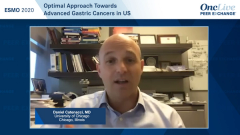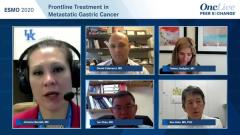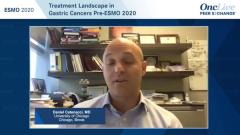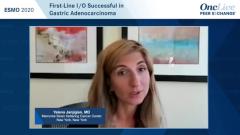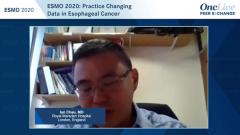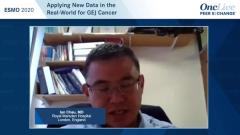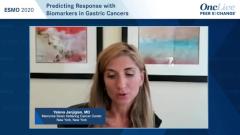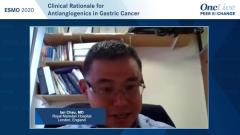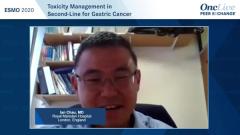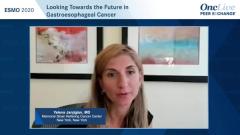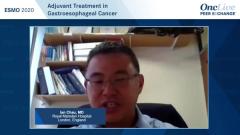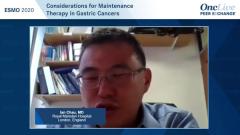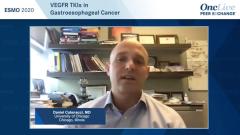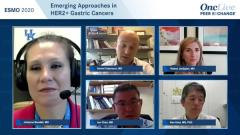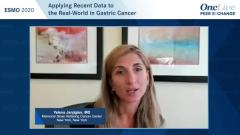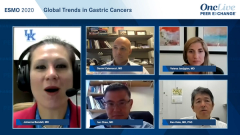
Applying Data to the Real World in Gastric Cancer
Episodes in this series

Transcript:
Johanna Bendell, MD: Thank you to all of you for a rich and informative discussion. Before we conclude, I’d like to get final thoughts from each of you. Let’s start with you, Dr Catenacci.
Daniel Catenacci, MD: It’s been a pleasure discussing this today, and it’s nice to have positive studies, let’s start with that. That said, you’ve heard my responses, and I think we have to look at the data; we have to see all the data and look at them critically. My motto is targeted therapies for targeted populations, and immunotherapy is not immune to that concept. I think we’ve seen in every study to date that there are patients who clearly benefit; there are patients who don’t, and in the studies that we’ve seen yesterday, we don’t have the data yet to really comment on whether chemotherapy plus immunotherapy checkpoint inhibitors will enhance their benefit compared to monotherapy. Before I comment on that, I’d like to see those data. If it shows it, great, because that’s what we would love to see. If it doesn’t, then we have to look at the data, and it may be sobering, but it’s the reality. That’s my final summary of all of those studies, including CheckMate-577 [NCT02743494], which I didn’t comment on specifically, but follows those exact same principals, and you can see that in the forest plots.
Johanna Bendell, MD: Dr Chau?
Ian Chau, MD: I echo what Dan said. Sometimes the devil is in the details, and some of it, we want to see more detailed data, and for some of it, you can get more from the studies already done. Because we talk about exactly what’s happening between CPS [combined positive score] 1 and 5, but there should be data available for ATTRACTION-4 [NCT02746796]. They have not reported any CPS data, and that’s another 700-patient data set that we can get more out of to supplement what we hear from CheckMate-649 [NCT02872116].
Daniel Catenacci, MD: And for CheckMate-577, there are no CPS data; that is really important.
Ian Chau, MD: Yes, absolutely. From all these studies that we’ve heard the top-line data, we really want to hear more details, and there may be things that they haven’t even done that we really want to hear about. I think it’s important, apart from looking at what could benefit our patients, we need to also push our pharmaceutical colleagues to say that these analyses need to be done to guide us.
Daniel Catenacci, MD: And be made public.
Ian Chau, MD: And made public.
Johanna Bendell, MD: Dr Janjigian?
Yelena Janjigian, MD: It’s a great discussion, and I think there’s a lot of enthusiasm. The research light is really shining bright in our corner. The next few months, before hopefully the onslaught of the vaccine trials, The New England Journal of Medicine hopefully will see a lot of these data published, and the devil will be in the details. I want to finish up with some positive thoughts. I think in the West, we need to really put all of our patients on clinical trials so that we can understand the difference in the biology and answer very important questions in an expeditious manner. As we heard earlier today, some of these trials are struggling, so please, if you have a patient who is interested in clinical trials, even for the advocates and the patients out there, use the tools available online and find these trials and participate on them because without these trials, we could not have these answers.
Biomarker analysis will be critical and needs to continue. The subset of patients that we’ve continued to struggle with are the genomically stable signet ring cell type of gastric cancer, and for those patients, we need to continue to study them both on the somatic alteration level but also germline analysis of gastric cancer. And esophagus cancer is the next frontier. Hopefully the enthusiasm in this disease will continue to carry us, and more patients will receive second- and third-line therapy because that’s the only way we can really change the curve on this disease, seeing it as a chronic disease, and as a marathon as opposed to a sprint, to try to minimize toxicity to our patients and focus on quality of life.
Another thread at ESMO [the European Society for Medical Oncology annual meeting] this year was nutritional support for our patients, how important it is early on and ongoing, and to use a multidisciplinary approach. Those are all the factors. We argue so passionately about difference in the deltas of a few weeks, when clearly data suggest that specialized care, excellent nursing care, and symptom management can improve survival of our patients in a more meaningful way than some of the targeted agents that we have.
Johanna Bendell, MD: Very good. Finally, Dr Kato?
Ken Kato, MD, PhD: I’m happy to attend this historic time when the standard of care is changing for both gastric cancer and esophageal cancer; this is an historic era. We have a positive result moving forward in development in gastric and esophageal cancer. But there are some questions...and I hope that global development becomes more action-oriented for gastric and even for esophageal cancer, and we move forward to do more for the patient with esophageal cancer. I wish for further development with accelerated, real global study, I hope. Thank you.
Johanna Bendell, MD: Thank you so much. And thank you again to our viewing audience, we hope you found this OncLive® Peer Exchange discussion to be useful and informative. Thank you very much.
Transcript Edited for Clarity


